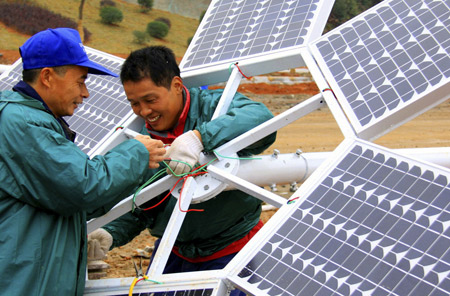Society
- Details
- By David Cao
- Hits: 808
The country's top legislature adopted on Saturday an amendment to the renewable energy law that requires electricity grid companies to buy all the power produced by renewable energy generators.
The amendment says the State Council energy department and the State power regulatory agency should supervise the purchases.

Technicians assemble a solar-powered street lamp in Jing'an county of Jiangxi province on December 11. Official statistics showed China as a leader in hydro and solar power usage last year.
- Details
- By David Cao
- Hits: 728

According to a recent survey, a whopping 98 percent of the women in the Macao special administrative region dream of marrying soldiers of the People's Liberation Army of Macao garrison.
The survey, which was conducted by a local media group, however, did not mention the number of women interviewed.
The women said not only was the reputation of PLA soldiers sound, they were also extremely good looking.
- Details
- By David Cao
- Hits: 635
Legislators clear way to cover liabilities from pollution to privacy
A long-awaited law designed to ensure people get compensation when their civil rights are infringed finally got the green light from China's legislators at the weekend, seven years after its first reading.
The 92-provision Tort Law covers a range of liabilities, including traffic and medical accidents, work-related injuries, pollution, harm caused by pets and mental distress.
It also covers infringements of personal rights, such as reputation and privacy.
The National People's Congress (NPC) Standing Committee on Saturday endorsed the law, which will take effect in July and have equal importance with the Property Law.
Read more: Chinese civil rights law gets nod, Human rights breakthrough in China
- Details
- By David Cao
- Hits: 985



NFL Cheerleaders In Iraq ~ Booty Everywhere ~ MS. New Booty
Read more: Differences between Chinese and american ways to salute troops : photos
- Details
- By Christine Laskowski
- Hits: 1023
 As the year 2009 comes to a close, it does so having been a monumental year for China's LGBT community. Beijing and numerous cities across China experienced the successful completion of 12 anniversaries and public events that expose LGBT culture and related issues like never before.
As the year 2009 comes to a close, it does so having been a monumental year for China's LGBT community. Beijing and numerous cities across China experienced the successful completion of 12 anniversaries and public events that expose LGBT culture and related issues like never before.
China's LGBT community, which is an acronym that refers to lesbians, gays, bisexuals and transgender people, has adapted the terms tongzhi to refer to gays, lala for lesbians, ku'er for queer - an umbrella term for those who do not identify as heterosexual with regard to sexuality, sexual anatomy or gender identity.
The community is young. Most are in their 20s and 30s, are educated, working professionals with experience abroad who are now highly active and public organizers, authors, editors, designers, film directors, curators, activists and artists.
One catalyst was the Olympic Games in 2008, a landmark event that many in the LGBT community have interpreted as a "coming out" event. LGBT websites have allowed for communities to build, to advertise events, and to allow contact and information to be exchanged between LGBT members from big cities and small towns in China with those from around the world.
More Articles …
Page 182 of 255